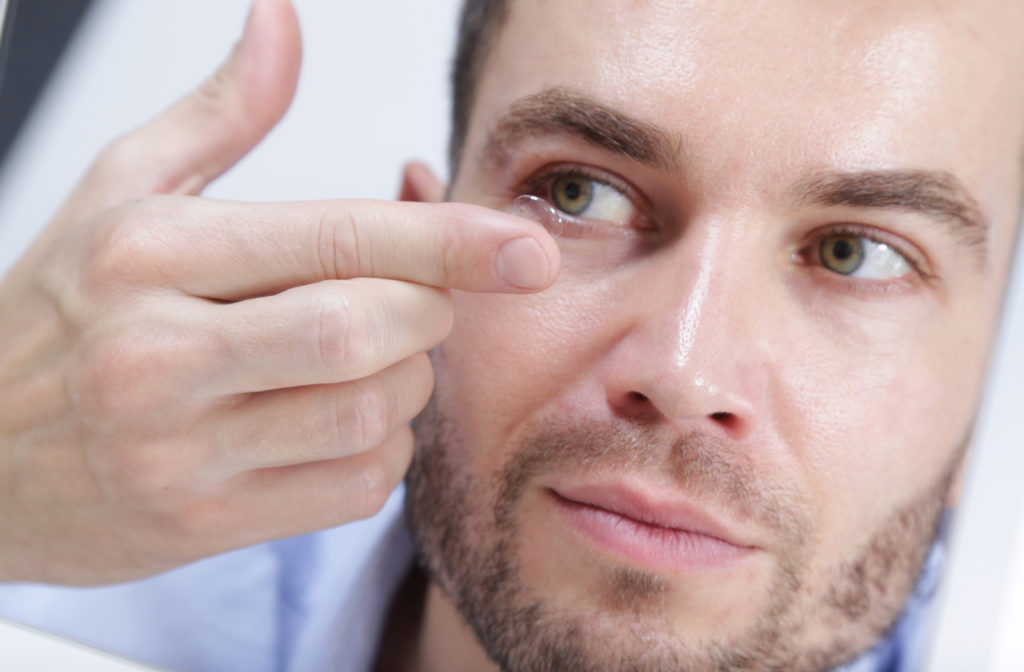You love the look of contact lenses and want to avoid carrying around your glasses whenever you can.
There’s just one problem—dry eye disease.
Dry eye disease is an eye condition that can bring discomfort and be stressful to deal with and manage. It occurs when your tears cannot provide enough lubrication for your eyes.
You want your ideal look, but how do you prevent dry eyes while wearing contact lenses? And is that even possible?
Let’s explore your options.
Dry Eye Prevention
Preventing dry eyes is an ongoing process. It can appear at any time for various reasons, and the symptoms can be a good indication of impending dry eye.
Some of these symptoms include:
- Eye redness
- Sensitivity to light
- Difficulty wearing contact lenses
- Blurred vision or eye fatigue
- A stinging, burning, or scratchy sensation in your eyes
You may think you have to give up contact lenses for good if you suffer from dry eyes, but this isn’t the case.
The first step in preventing dry eye while wearing contact lenses is to find out which contact lenses work for you. Usually, soft lenses are more comfortable for people with dry eyes rather than hard contact lenses.
Soft lenses stay moist and allow your eye to breathe and stay lubricated.
Beyond choosing the right contact lenses, there are some at-home methods you can practice to alleviate dry eye symptoms.
These methods include:
- Adding moisture to the air
- Wearing protective eyewear
- Using eye drops
- Giving your eyes breaks from long tasks
Keeping up with proper maintenance and cleaning of your contact lenses is essential. Cleaning your contact lenses prevents protein deposits, which can make your eyes feel even drier.
So, you want to continue wearing contact lenses but need to find the right ones for you? Let’s explore some of the different types of contact lenses, so you know what to expect.
Dry Eye & Contact Lenses
Treating the cause of dry eye or changing to a different type of lens can help you.
Preventing dry eyes is all about adequately lubricating your eyes and making sure your eyes produce enough tears.
Your optometrist can help you go through all your options, but a great first step is exploring some of the different lens materials.
Soft Lenses
Soft contact lenses consist of hydrogel, which contains water and flexible plastic that allows oxygen to pass through the eye. Soft lenses often offer a disposable option that can eliminate the cleaning process.
Rigid Gas Permeable Lenses
Rigid gas permeable lenses are viable for people with astigmatism or whose eyes require breathable contacts that allow oxygen to pass through to the eye. These lenses are also stiffer than soft contacts and made from silicone.
These are the most common contact lenses you’ll encounter. Still, if your dry eyes aren’t compatible with these, you can look into other specialty contact lenses.
Scleral Lenses
Scleral lenses are larger in diameter than traditional contacts. They’re ideal for irregular corneas or other issues, including dry eyes.
Scleral lenses cover the whole cornea and allow for space between the cornea and the back surface of the scleral lens, allowing for a fluid reservoir to provide comfort for people with dry eyes.
Hybrid Lenses
Hybrid lenses are customized lenses that take more time and expertise to fit. These lenses are great for people who suffer from keratoconus or irregular corneas. The outer portion of the lens is flexible and comfortable, while the inner portion creates a sharper image.
Now that you know the options out there—it’s important to note that preventing dry eye disease is about consistency whether you wear contact lenses or not.

Moving Forward With Your Contact Lenses
You’re committed to your contact lenses and don’t want to give that up due to dry eyes—that’s understandable. Luckily there are options for you, and your optometrist can guide you through the process.
Book an appointment with your optometrist today to learn more about what contact lenses could work for you to help with your dry eyes.

